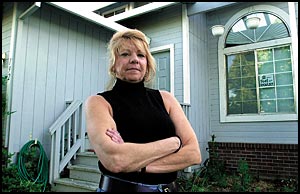The institute is one of the largest opponents of a California bill that seeks to give homeowners more time when faced with association foreclosure. About 9 million Californians live in CIDs, which can include five to 5,000 units. The association is made up of a board of directors, who are elected by the residents. Each board member must own property in the community. The board uses homeowner dues -- ranging from $10 to a few hundred dollars a month -- to maintain the community's streets, parks, clubhouse, pool and other common property shared by the homeowners. All associations are supposed to have contracts describing their collection policies, and many reserve the right to use foreclosures without a court action if the homeowners' account becomes delinquent. Sentinel Fair Housing in Oakland estimates that up to 10 percent of all foreclosures in 2001 in five Northern California counties were initiated by a homeowners association, said Associate Director Steve Cogswell. "We've found that in Sacramento, Alameda, Contra Costa, Santa Clara and San Mateo counties ... that the average foreclosure amount by homeowners associations is for around $2,500," Cogswell said. "Compare that to other foreclosures where the average amount is for $190,000." "We estimate that Common Interest Developments will file about 770 notices of default during this current year," Cogswell said. D'Agostino, 45, said she was caught off-guard when her association told her it was going to foreclose on her house. Her case played out like this: Late in 2001 her house was destroyed by a fire. While rebuilding, she fell behind on her monthly dues, which amounted to around $250. She tried to pay it off, but additional fees and late charges pushed the bill above $1,800. She disagreed with the charges and refused to pay. That led to a lien being placed on her house, and foreclosure proceedings began the next month. "It's unbelievable because I almost lost my house once and then they tried to take it from me again," D'Agostino said. California housing advocates say the problem lies in the associations' contracts, which they say are snarled with bewildering rules and policies. "When you buy your homes and the deal is complete, you're signing 500 papers and one of the papers is the covenants, conditions and restrictions," said Marjorie Murray, spokeswoman for the California Congress of Seniors. "They just don't understand the ramifications when they sign that contract." But D'Agostino's association, the property manager and the collection agency say she received notice after notice telling her she could lose her home during the six-month process to collect the dues. "It doesn't just come out of the blue and someone is trying to sell your house," said Dan Kocal, president of Kocal Property Management, which oversees 8,500 CID households in Northern California, including Creekside Circle. "There's a long, long process. Nobody wants to foreclose on someone's house, but if everyone else is paying their dues, then there's a problem." A bill approved by the Assembly last week seeks to clarify the contract for homeowners and give them more time to pay off delinquent accounts and avoid foreclosure. AB2289, authored by Assemblywoman Christine Kehoe, D-San Diego, and sponsored by the California Congress for Seniors, would require associations to clearly and regularly tell homeowners that failure to pay the fees could result in the loss of their home without court action. |


